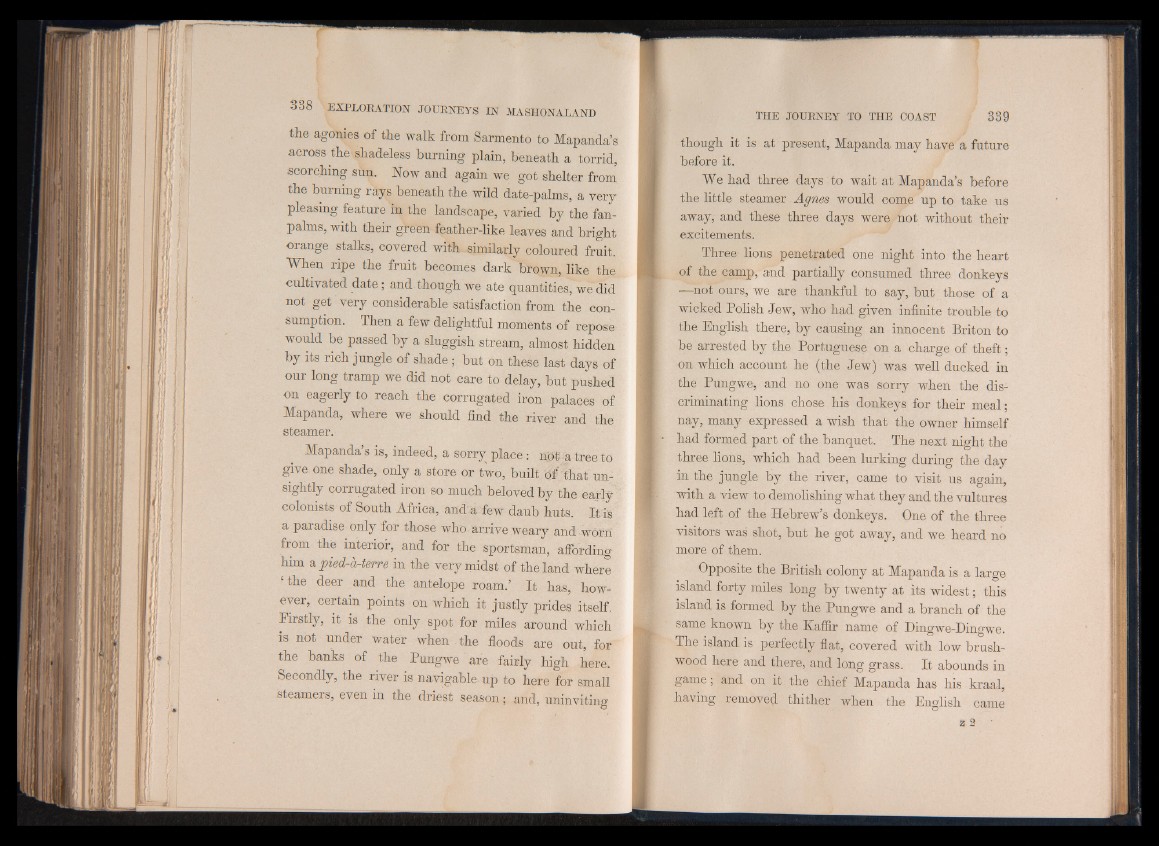
the agonies of the walk from Sarmento to Mapanda’s
across the shadeless burning plain, beneath a torrid,
scorching sun. Now and again we got shelter from
the burning rays beneath the wild date-palms, a very
pleasing feature in the landscape, varied by the fan-
palms, with their gieen feather-like leaves and bright
orange stalks, covered with similarly coloured fruit.
When ripe the fruit becomes dark brown, like the
cultivated date ; and though we ate quantities, we did
not get very considerable satisfaction from the consumption.
Then a few delightful moments of repose
would be passed by a sluggish stream, almost hidden
by its rich jungle of shade ; but on these last days of
our long tramp we did not care to delay, but pushed
on eagerly to reach the corrugated iron palaces of
Mapanda, where we should find the river and the
steamer.
Mapanda’s is, indeed, a sorry place : not a tree to
give one shade, only a store or two, built of that un-
sightiy corrugated iron so much beloved by the early
colonists of South Africa, and a few daub huts. I t is
a paradise only for those who arrive weary and worn
from the interior, and for the sportsman, affording
him a pied-à-terre in the very midst of the land where
‘the deer and the antelope roam.’ It has, however,
certain points on which it justly prides itself.
Firstly, it is the only spot for miles around which
is not under water when the floods are out, for
the banks of the Pungwe are fairly high here.
Secondly, the river is navigable, up to here for small
steamers, even in the driest season; and, uninviting
though it is at present, Mapanda may have a future
before it.
We had three days to wait at Mapanda’s before
the little steamer Agnes would come up to take us
away, and these three days were not without their
excitements.
Three lions penetrated one night into the heart
of the camp, and partially consumed three donkeys
—not ours, we are thankful to say, but those of a
wicked Polish Jew, who had given infinite trouble to
the English there, by causing an innocent Briton to
be arrested by the Portuguese on a charge of theft;
on which account he (the Jew) was well ducked in
the Pungwe, and no one was sorry when the discriminating
lions chose his donkeys for their meal;
nay, many expressed a wish that the owner himself
had formed part of the banquet. The next night the
three lions, which had been lurking during the day
in the jungle by the river, came to visit us again,
with a view to demolishing what they and the vultures
had left of the Hebrew’s donkeys. One of the three
visitors was shot, but he got away, and we heard no
more of them.
Opposite the British colony at Mapanda is a large
island forty miles long by twenty at its widest; this
island is formed by the Pungwe and a branch of the
same known by the Kaffir name of Dingwe-Dingwe.
The island is perfectly flat, covered with low brushwood
here and there, and long grass. It abounds in
game; and on it the chief Mapanda has his kraal,
having removed thither when the English came